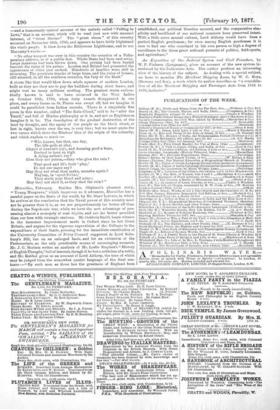Macmillan, February. Besides Mrs. Oliphant's pleasant story, "Young Musgrave," which
improves as it advances, Macmillfm has a careful paper on the fleets of the world, by Mr. Shaw Lefevre, in which he arrives at the conclusion that the Naval power of this country need not be greater than it is, as we are proportionately far better off than during the Napoleonic war, while we have the new advantage of pos- sessing almost a monopoly of coal depots, and are far better provided than our foes with strategic stations. Mr. Goldwin Smith bears witness to the immense improvement made in Oxford since he left Groat Britain, and argues for the vigorous supervision of the Colleges in the expenditure of their funds, pressing for the immediate constitution of
the University Committee of Privy Council suggested in Lord Salis- bury's Bill, but on an enlarged basis, and for an extension of the Professoriate, as the only practicable means of encouraging research. Mr. J. C. Morison writes an analysis of Mr. Leslie Stephen's "History of English Thought,"full of interest, though it be but a criticism of a critic, and Mr. Kebbel gives us an account of Lord Althorp, the tone of which may be judged from the somewhat quaint language of the final sen- tence :—"By such men as these has the greatness of England been established, oar political liberties secured, and the comparative sim- plicity and hardihood of our national manners been preserved intact. With a little more mental culture, Lord Althorp would have been a perfect English gentleman ; for even among English gentlemen it is rare to find one who combined in his own person so high a degree of excellence in the three great national pursuits of politics, field-sports, and agriculture."


































 Previous page
Previous page